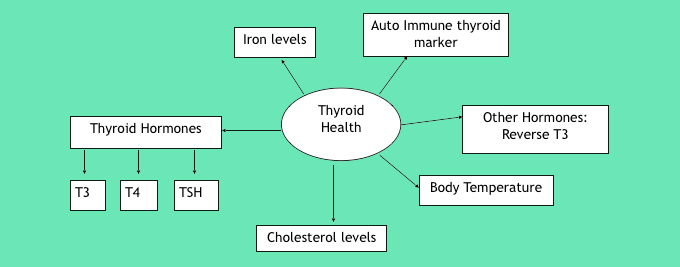We all feel tired sometimes— work weeks can stretch us a little thin, if we get a case of the cold or flu we can experience fatigue, or sometimes the kids just don’t sleep (and that means you don’t either)! Though feeling low on energy happens to everyone at different times, feeling tired most of the time isn’t something that you should let slide unnoticed. Thyroid complications often cause an underlying fatigue that is hard to beat and, sometimes, a quick blood test doesn’t tell everything you need to know about your thyroid’s function. In this article Dr. Bristow explains how the thyroid works, what tests are needed to see how the thyroid is really doing, and some of the support she offers to those with hyperthyroidism.
I want to start this article off by saying that if you wondered if your thyroid was a problem, have already had it tested and you’ve been told “you’re fine,” keep reading! This article is for everybody with thyroid dysfunction, but especially for those of you who are tired and no one has been able to tell you why. It’s time to figure out if thyroid dysfunction is a piece of your puzzle once and for all. Hypothyroidism is a reason for fatigue, but realistically fatigue has many different contributing factors. In fact, the biochemical causes of fatigue intersect the function of the thyroid, adrenal glands, ovaries (called the OAT axis) and the liver. More on that topic another time, though! For now, let’s stick to the thyroid basics.
What are common symptoms of hypothyroidism?
- Feeling cold or intolerant to cold environments (feeling this less from hot flashes doesn’t count as an improvement!)
- Cold hands and feet
- Hair loss or hair thinning
- Irregular menstrual cycles, heavy menstrual bleeding, low libido, PMS, water retention
- Constipation (if you have digestive issues this may not be an applicable symptom)
- Brittle, breaking, or peeling nails, dry skin
- Poor memory, depression, foggy thinking, inability to focus, fatigue
- Low iron or high cholesterol
What are the different hormones created by the thyroid?
The most commonly tested value is TSH (thyroid stimulating hormone), which is secreted by your pituitary gland, a pea sized gland at the base of your brain. It is a basic marker of thyroid health, but it certainly doesn’t give you the whole picture. The range is typically 0.2-4.0mlU/L on a blood test.
You are typically told that your thyroid is “fine” as long as you fall within that range, however this is a wide range and most Naturopaths’ prefer to see this at or below 2.0. The reality is TSH only indicates how much stimulation your brain is giving your thyroid to pump out hormones. There are many things that can interfere with the proper function of the thyroid and its uses of hormone. TSH on its own can’t tell us enough about the in’s and out’s of your thyroid health.
The thyroid also produces two thyroid hormones: 80% is T4 and 20% is T3.
T3 is considered the “active” thyroid hormone as it is 4X stronger than T4. Your thyroid packages most T4 & T3 onto a transport protein that shuttles it all over your body. When the hormones are bound like this we can’t accurately measure them in blood.
We can, however, measure the free T4 & T3–a small percentage of the hormones, but it gives us a pretty good idea of what’s floating around, coming there, making its way to and from your tissues. This is why having a free T3 & free T4 test is a good idea. We can compare the ratio between the two and make sure that both hormones are in the upper range of normal. Once the hormones arrive at the tissue, T4 is converted into T3, increasing the speed of all the functions of the cell. Problems often occur in this conversion from T4 to the more active T3, because it needs healthy tissues and a sufficient supply of vitamins and minerals for this chemical process to happen.
In order to understand your symptoms, we need to compare other elements to get the full picture:

The moral of the story is to have your thyroid completely evaluated before dismissing it as a potential cause for fatigue. So keep it in the questionable category until a knowledgeable practitioner has run through the test gamut with you.
If you’ve already been diagnosed with hypothyroidism and you’re taking Synthroid (synthetic T4), make sure you are checking free T3 with your routine blood work. The problem is less commonly identifiable by the T4 supply than with the T4 to T3 conversion. More T4 won’t necessarily fix that problem, but supportive herbs and nutraceuticals can be of major assistance.
Naturopathic Doctors can run these thyroid markers for you, so come see me if you are curious! I also do free 15 minute meet and greet sessions. You can book an appointment with me here.
